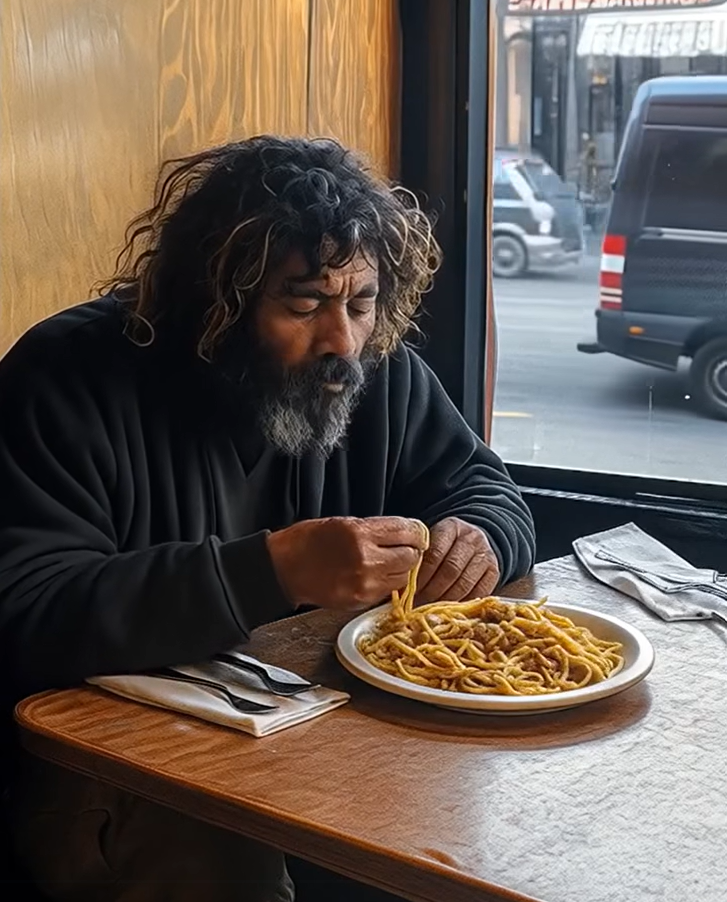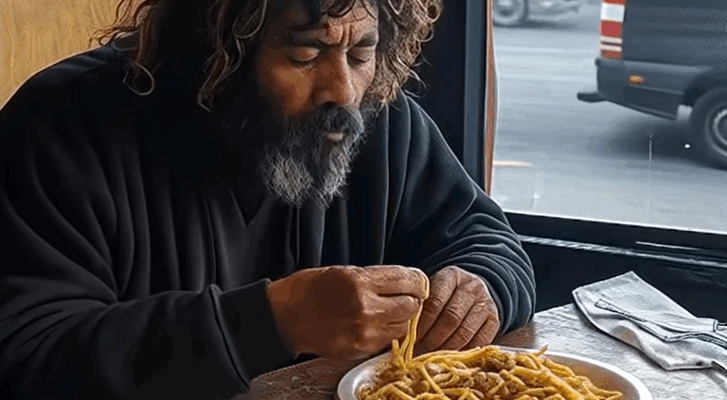He Visited His Company Disguised as Homeless — What One Employee Did Changed Everything
Chapter 1: The Clock Ticks Down
Richard Whitmore stood at the edge of his massive balcony, overlooking the city skyline that had once thrilled him. Now, it felt hollow.

He had just returned from the hospital, where the words “terminal,” “inoperable,” and “three months, maybe four” echoed in his ears like church bells at a funeral.
Whitmore Industries was his life’s work — a corporation built from the ground up. Fifty-two branches. Over six thousand employees. And no one to leave it to.
He had no children. His wife, Eleanor, had passed seven years earlier. His younger brother had squandered his inheritance long ago.
Most would’ve picked Tom: a slick, hungry, Harvard-educated branch manager who had once been Richard’s favorite. But something about Tom’s ambition had curdled over time into arrogance. He reminded Richard too much of the corporate machine he had once vowed never to become.
Richard wanted more than a successor.
He wanted a soul.
And so, a plan took root — strange, risky, and entirely his own.
Chapter 2: The Disguise
Three days later, Richard stood before a full-length mirror in his walk-in closet, almost unrecognizable.
He had swapped his Armani suit for torn jeans, a frayed hoodie, and a beaten-up winter coat. His personal makeup artist — sworn to secrecy — applied dark makeup under his eyes, added a few fake bruises, and glued on a patchy beard.
He looked like any man you might pass on the street — invisible, avoided, judged.
His driver dropped him off at the Midtown branch, the company’s flagship office.
As Richard shuffled into the grand glass lobby, no one greeted him. Eyes averted. Phones lifted to ears. One man walked in a wide circle to avoid brushing shoulders.
He sat down quietly in a corner near the heater and waited.
Chapter 3: The Cold Reception
After fifteen minutes, a young receptionist finally called security.
Tom arrived moments later, furious.
“What the hell is going on?” he snapped.
“Sir,” the guard explained, “this man won’t leave.”
Tom turned to Richard and said flatly, “You’re not welcome here. We’re a professional organization, not a shelter.”
“I don’t want trouble,” Richard said gently. “Just a few minutes to get warm.”
“You’ve got thirty seconds before I call the cops,” Tom barked.
Just then, a soft voice cut through the tension.
“Hold on.”
A woman approached — no older than twenty-six. Her brown hair was pulled back in a bun, her coat too thin for the weather.
“Nancy Meyers,” her name tag read. Administrative assistant.
She looked at Tom with quiet determination. “He’s not harming anyone.”
Tom rolled his eyes. “You want to take responsibility for him?”
Nancy didn’t flinch. “If that’s what it takes.”
She turned to Richard, her voice kind. “Sir, would you like something warm to drink?”
He nodded.
She returned minutes later with a hot coffee, a sandwich from the vending machine, and her own scarf.
Richard’s eyes met hers. Something ancient and raw flickered there — not pity, but recognition.
“You didn’t have to do this,” he murmured.
“I know,” she said. “That’s why I did.”
Chapter 4: The Goodbye
Security eventually forced him out, despite Nancy’s protest.
But as Richard stepped into the freezing wind, he glanced back.
Nancy was watching from the window. She gave a small wave.
And Richard smiled.
Chapter 5: The Announcement
Richard died quietly in his sleep six days later.
The company was stunned. The media called him a legend. Tributes poured in.
Tom, meanwhile, walked around like a king-in-waiting. He told his wife to start house-hunting in the Hamptons. He even rehearsed a speech titled “Legacy and Leadership.”
But then came the lawyer.
He entered the boardroom with a briefcase, greeted no one, and asked Nancy to join him at the head of the table.
Tom laughed out loud.
“I think you mean me,” he said smugly.
The lawyer opened a sealed envelope and cleared his throat.
“In the final weeks of his life, Mr. Richard Whitmore conducted a personal assessment of each branch — incognito. His goal was to find not the smartest or the most successful, but the most compassionate. The person who understood that leadership is not power, but service.
That person… is Nancy Meyers.”
The room fell silent.
“Mr. Whitmore has left full ownership and executive leadership of Whitmore Industries to Ms. Meyers, effective immediately. A personal letter will explain the rest.”
Tom stood frozen. Nancy’s eyes filled with tears.
Chapter 6: The Letter
Later that night, in her small studio apartment, Nancy read the handwritten letter under a flickering desk lamp.
Dear Nancy,
You didn’t know who I was. You had nothing to gain. But you helped me anyway.
In that moment, you reminded me of the man I used to be — before money, before pride.
This company needs a heart, not just a head. I believe you are that heart.
Lead as you lived: with courage, kindness, and integrity. And never forget — the greatest empires begin with a single act of decency.
Yours in faith,
Richard Whitmore
Nancy wept. Not for the money, not for the title — but for a man who had seen her when she was invisible to everyone else.
Chapter 7: A New Beginning
Nancy declined a chauffeur. She kept riding the subway. Her first executive decision was to raise the minimum wage across all branches.
She built a wellness center. She established a hardship fund. And she visited every branch — not in a limo, but with a notebook and a listening ear.
Some doubted her at first. But within a year, productivity soared. Employee satisfaction reached all-time highs. Clients returned. Investors praised the “Meyers Model.”
The company didn’t just survive Richard’s death — it flourished.
Because of one woman.
One scarf.
One cup of coffee.
Epilogue: The Legacy
Years later, Nancy stood onstage at a leadership conference. Her speech was titled “The Day I Met a Stranger.”
She ended it with this line:
“You never know who you’re speaking to — or what they’re going through. But if you choose kindness anyway, you just might change the world.”
The crowd gave her a standing ovation.
And somewhere, perhaps, Richard was smiling.
